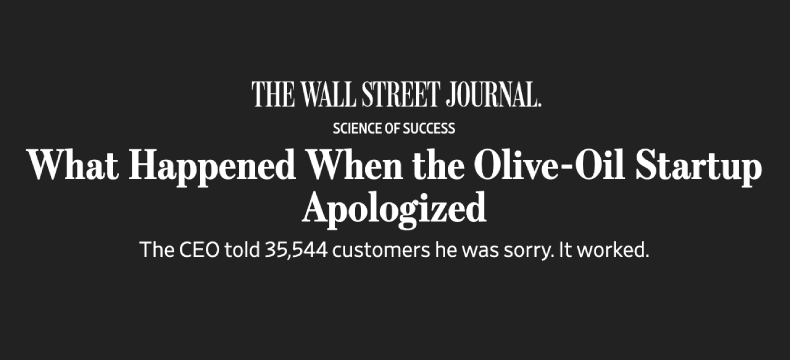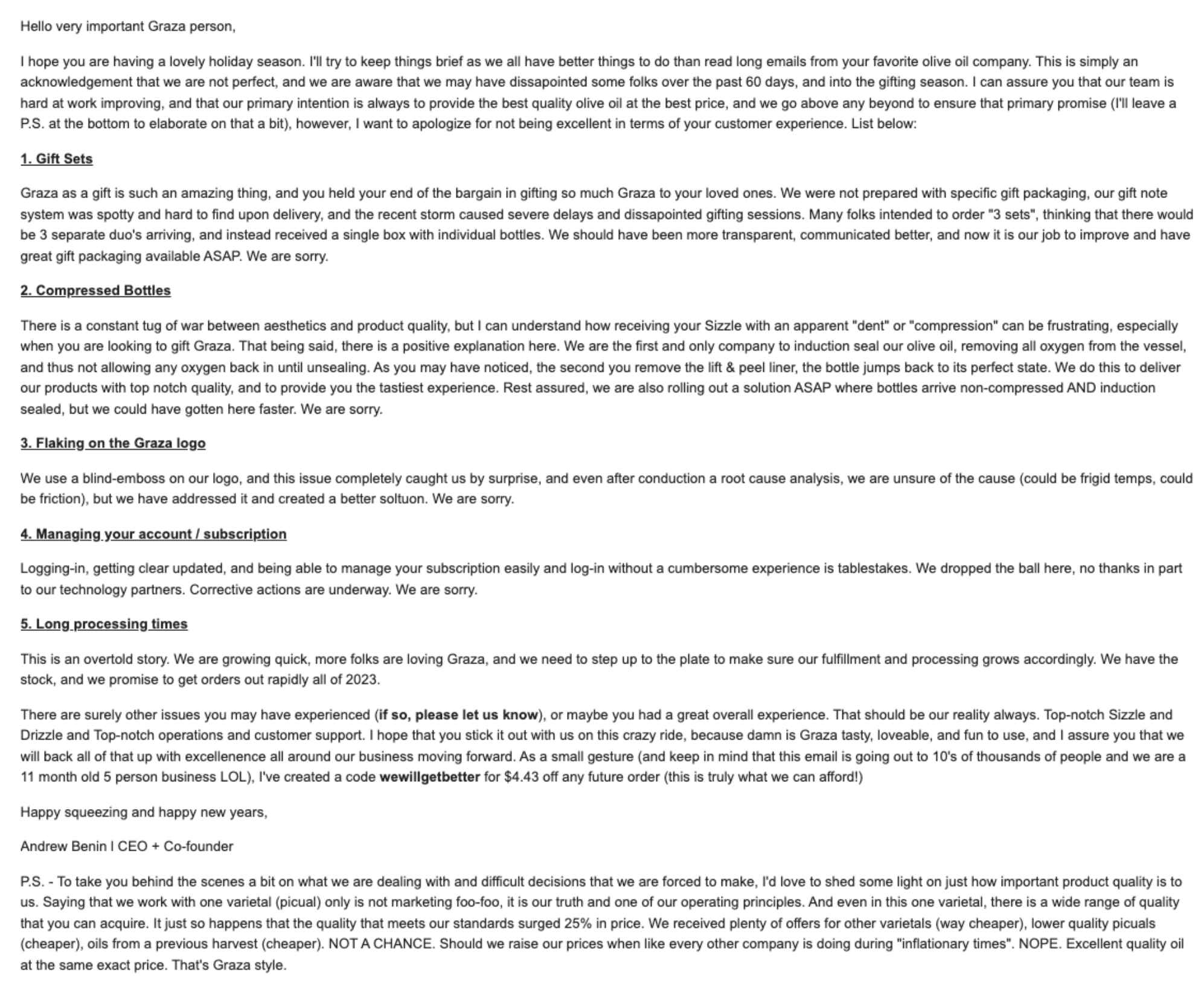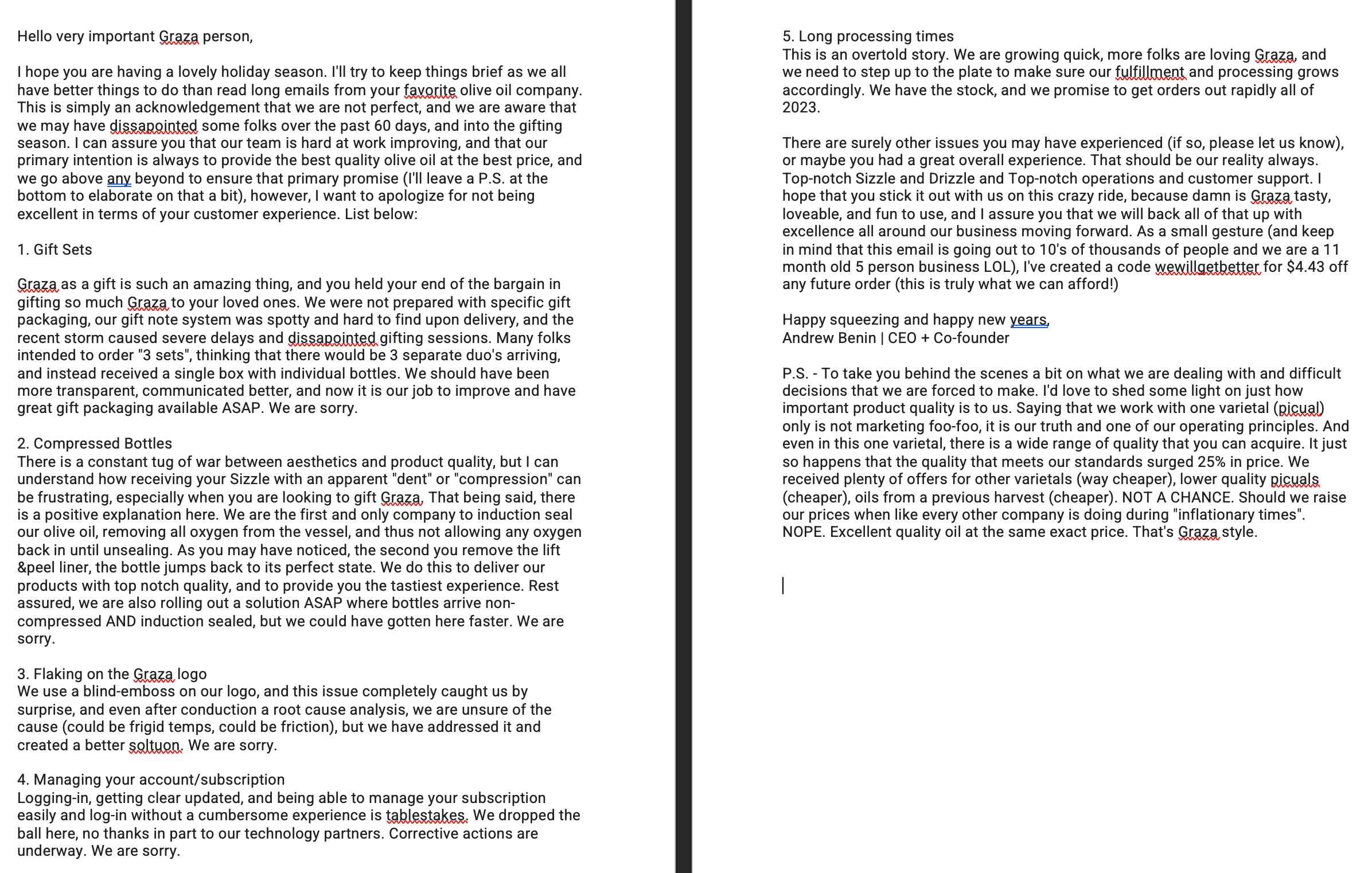
Andrew Benin is the 35-year-old chief executive and co-founder of Graza, an olive oil brand that comes in a squeezy tube (unlike bottles). He made news recently in the Wall Street Journal for an apology!
Wall Street Journal, on January 14, 2023 (the online version came out on the 12th of January), had a fairly long story on Andrew’s apology that he had sent to 35,544 customers via email. It’s an interesting story that concludes with, “The curious thing about a memorable apology is that it can leave a company in a better position than before it had any reason to apologize”.
Here is the full email apology:

However, there are a few things I’d like to add to the apology and the background that led to it, from the perspective of corporate communications.
When Graza’s website was launched in January 2022, as a direct-to-consumer product available on its website, interest spiked from offline retailers like Whole Foods and it started retailing both from its own website and also being available in stores offline.
In December 2022, Graza’s oil was in much demand since it was added to many holiday season/Christmas gifting guides. So orders from its website were significantly high and amidst the blizzard and during Graza’s first holiday season, the company was struggling to fulfill orders through its website.
1. The trigger for the apology
According to Wall Street Journal, customers who ordered 3 separate sets, got one big pack of all 6 bottles (Graza has 2 variants – ‘Sizzle’ and ‘Drizzle’). Packs were delievred with dents. Many shipments were delayed too because of the nasty blizzard that hit the US at the end of December 2022.
Obviously, customers were disappointed and were telling the company about it. But there was hardly any negative chatter online on any of the social media platforms that usually becomes a trigger for an apology in most other organizations.
That leads to the question as to why Andrew chose to apologize at all.
2. The reason for the apology
Graza would have received feedback about the messed up orders directly by email and phone calls, most probably. The WSJ article is silent on this part. The reason for the lack of social media chatter on the messed up orders could also be a factor of the company being really new and the overall customer base being really small (relatively).
So why did Andrew send that apology email at all?
That’s the heart of this entire story. To quote WSJ, “It wasn’t exactly a crisis, but Mr. Benin wasn’t proud of Graza’s performance, and he took responsibility”.
In other words, in conventional terms, there was no crisis worth an apology for.
But Andrew put himself in the shoes of a Graza customer whose order was messed up. How would he, as a customer, react? He’d be disappointed with the experience.
Is it a make-or-break disappointment that would have a customer stay off Graza? That seems unlikely, but we can assess that only if we know about the kind of feedback the brand was receiving on the back of the delivery issue at that point.
It’s more likely that Andrew, thinking on behalf of a customer of an under-1-year brand, considered how to set the experience right.
This goes back to what I had written a few days ago, in terms of my experience ordering mattresses, and the Zomato experience on December 31, 2022. In the case of Zomato, they came back not just with the bare minimum gesture in terms of setting things right (a refund), but went above and beyond conventional corporate reactions (which is generally not scalable and has to be selective).
3. Above and beyond an apology
The promo code for $4.43 in the next order is the above-and-beyond. Andrew could have simply said sorry for the experience and ended it by promising to do better in the future. But the promo helps seal his intent, even though the amount is small (though not in relative terms given the product price is $15 and $20, respectively for sizzle and drizzle).
We expect these promo codes in services like Uber or Zomato because they have made such cashback in the face of a negative experience as a basic feature (or cost of doing business). For a new brand like Graza, that too one that is rather small, and coming directly from the CEO and not a bot/corporate email ID, this is a fairly big deal in terms of earning back trust.
4. The email’s tone!
This is the most interesting part, for me.
The email reads like Andrew speaking impromptu in front of a customer.
There are small flourishes that come naturally in the email’s personal tone:
- “we are a 11 month old 5 person business LOL”
- “I’ve created a code wewillgetbetter for $4.43 off any future order (this is truly what we can afford!)”
This is a direct, personal communication that makes his customers forget they are reading off an email from a CEO and makes it seem like they are hearing a friend’s heartfelt reply to something gone wrong.
In fact, I’d wager that the customers may feel they are less disappointed in front of Andrew’s email 🙂 He seems more disappointed in his company’s actions with the repeated ‘We are sorry’ after every paragraph! That would disarm any disgruntled customer and put them on the company’s side almost instantly. It’s no wonder the email had a 78% open rate (with the subject, “Learning from our mistakes”), and 866 replies!
5. The grammatical and spelling mistakes!
There are tons of grammatical and spelling mistakes in the email (see the highlighted version) and ironically, instead of undermining the credibility or the competence of the CEO, they add a genuinely warm personal tone to the email!

You can question: can other CEOs emulate this tactic (given it has been successful for Andrew) and incorporate a personal tone and intentions spelling/grammatical mistakes in their apology to induce humanness and warmth?
That would depend entirely on what they are apologizing for, however.
The stakes in the case of Graza, from a customer’s viewpoint, are low. At the price-point of $15 and $20, and with tons of alternatives being available, what a disgruntled customer may lose is rather small in relative terms.
A CEO apologizing for layoffs—the current No. 1 reason why CEOs are apologizing these days—is a vastly different topic. The stakes are very, very high. The human cost and impact too are very high. It’s something that cannot be set right with promo codes or offers (though many companies have regularised the post-layoff steps, starting with Airbnb in 2020).
Plus, when the stakes are high, the legal team gets involved and raises multiple red flags on every single word in a public apology. Graza’s ‘5 person business’ and the fact that the stakes are low really helped Andrew be as personal and direct as possible. Very few companies can afford such candor.
Meaning: The Graza apology template is clearly not replicable or scalable.
Of course, it would be great if CEOs shunned the manufactured, heavily vetted speech when it came to an apology, but that’s being used for a reason – to protect the company from further impact. Andrew and Graza’s luck cannot be replicated in terms of corporate communications.
Quite a few circumstances led to that apology being the way it was and eventually led to it being celebrated in the Wall Street Journal.
